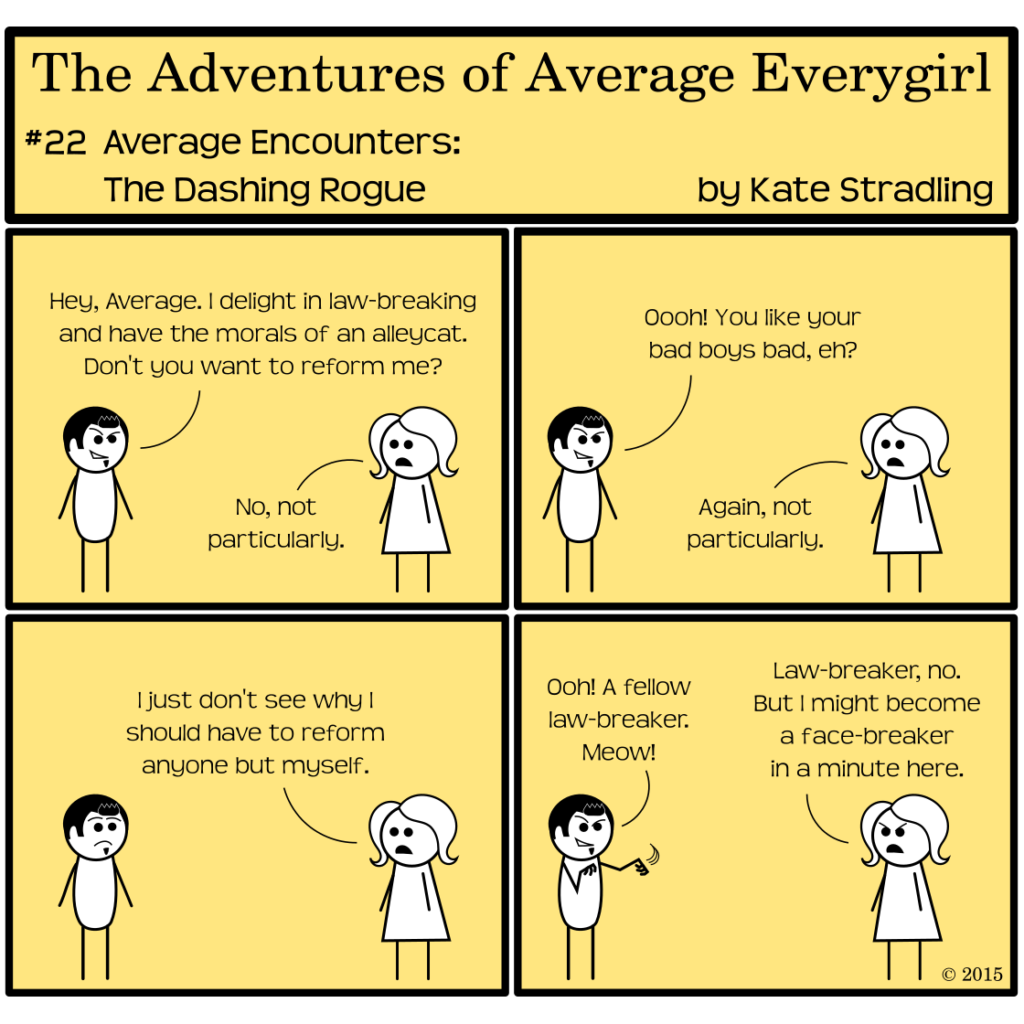
This week we take a look at that lovable, handsome ne’er-do-well that every woman itches to reform. He lives life on the edge! So rough, so hip, so much cooler and bad-boy-ish than your boring, everyday heroes! He’s the Dashing Rogue, and this winter, he’s wooing a nice traditional girl in a novel near you! Because contrived plot device!
(I should totally write marketing copy, don’cha think? Yeah, me neither.)
Old-school Dashing Rogues are the highwaymen, pirates, and Robin Hoods of literature, men who flout society’s rules and do it with panache. Modern Dashing Rogues aren’t nearly as interesting. The most stereotypical versions ride motorcycles, sport facial hair, and have tattoos to show what rebels they are.
Because tattoos are 100% the mark of a rebel, what with 36-40% of Americans between the ages of 18-40 sporting at least one nowadays.
Yeah. Pretty mainstream. But I digress.
Rogue in Action
The Dashing Rogue challenges his more conservative love interest’s worldview. The conflict of the story arises in their differences: two kids from opposite sides of the track, thrown together by Fate. This trope typically has two possible endgames:
- The Savior Complex: the nice, traditional woman must bring her reckless man back from the brink of his destructive behaviors; he is reformed by the end of the story.
- Corruption of Innocence: the nice, traditional woman gives up her higher ground to join her reckless man in his revelry; she is a Dashing Rogue-ette by the end of the story.
The lesser-used third option is for them to part ways, but that only happens if neither changes for the other (i.e., rarely). The rogue and the traditionalist can’t sustain a long-lasting relationship without one or the other giving in because they don’t have enough common ground to stand on.
And that’s what makes them so much fun.
That fine line where diametrically opposed worldviews collide is a magnificent point for storytelling. It provides natural tension not only between the two characters but within each character individually. “Do I want to be with this person who stands for everything I don’t? Why do I want to, and what am I willing to concede?” It’s a double layer of conflict, external and internal, all built into one delicious trope.
When it’s done well, that is. The poorly wrought Dashing Rogue omits any true internal conflict to focus more on physical attraction between characters with opposing morals. The long-term consequences that would result from engaging with one another get scant attention. And if the author throws a contrived love triangle into the mix—with a more traditional love interest juxtaposed against the Rogue to manufacture even more angst, of course—the story as a whole becomes disingenuous to any reader who’s paying attention.
Which is terrible. The very purpose of the Dashing Rogue is to create a sense of excitement and danger, not yawns and eye-rolling.
Case in point
For a good example of this trope, I tip my hat once again to Elizabeth Peters: in Street of the Five Moons, art historian and dedicated museum curator Dr. Vicky Bliss meets her match in art thief and unrepentant con man Sir John Smythe. Their adversarial relationship continues through four additional novels, with Vicky able to maintain her (mostly) law-abiding ideals while John slinks around in his questionable pursuits.
She knows he’s a scoundrel and he knows she’s too good for him. And yet they work as a couple because they’re an intellectual match. They respect each other, and they compromise beautifully when they must.
Plus, he’s just so dashing.
(I’d say “just kidding,” but he really is.)
Cue the music, because this one is the basis for my all time most frustrating movie: Grease. (ICK!) Good girl meets bad boy. They sing suggestive songs; they dance around. He reforms her, but in the end, she becomes just as big a sleaze as he. Yes–TRUE LOVE! I cannot for the life of me understand why so many people like this one.
And, if you think about it, my other least favorite–though classic–play into a movie, Romeo and Juliet, is a variation on this one, as well, but with disturbingly immature characters. Romeo IS a :bad boy” in her family’s definition, and he certainly aint a saint, and leads her down the path to destruction by his selfishness and impatience. Again: TRUE LOVE!
Hahahahaha! I hate Grease. So much. And I hate that I have to be so careful in who I tell, for fear of getting stoned by the True Believers. Rabid fans are rabid.
And yes, Romeo and Juliet is a variation, but I’m addressing that in next week’s trope, the Star-Crossed Lovers. It’s the reason I had to introduce the Dashing Rogue this week. (Surprise! There’s a method to my madness!)
So glad there are 2 other of this same opinion.
The question remains, why is this trope so very “exciting”? It sounds exhausting for an actual, in-the-flesh relationship to be like this. (semi-rhetorical question).
There are times when it works, and it can create a super fun dynamic, but yeah, it would be exhausting IRL.
Reminds me of an interview that Diana Wynne Jones did, where she basically questioned the sanity of any reader who was in love with the Wizard Howl. She was like, “He would be a complete nightmare to live with.” I’ve always adored his character, but she was right. (Her conclusion was that such readers see his roguish quirks as a challenge. And there may be some truth to that with the general Dashing Rogue trope as well.)
Comments are closed.